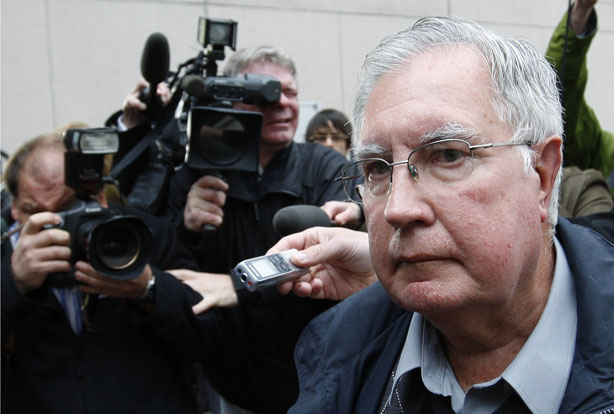By Charles Lewis
National Post
October 1, 2009
http://network.nationalpost.com/np/blogs/holy-post/archive/2009/10/01/asking-for-help-not-easy-for-priests.aspx
The child pornography charges laid against Bishop Raymond Lahey, above, were a shocking blow to Roman Catholics in Nova Scotia, who watched on television on Thursday as the once-exalted member of their community surrendered himself to police.
But this case, and others like it, trigger questions about how willing priests are to come forward and seek help when they are facing deep psychological problems.
Experts in the field of treating priests, while declining to comment specifically on the Bishop Lahey case, said many clergy are so concerned about undermining the holiness of their calling that they would rather live with their troubles then come forward.
 |
These experts are well familiar with the special pitfall priests face and why seeking out treatment — for anything from alcoholism to depression to addiction to pornography — can be so problematic even though help is widely available.
On Thursday, Bishop Lahey turned himself into police in Ottawa to be fingerprinted and interrogated by investigators, and was later released on bail. He was charged with possession and importation of child pornography after his computer was seized at the Ottawa airport last month.
Those who worked closely with Bishop Lahey in Antigonish, N.S., where he presided as bishop since 2003, were genuinely stunned by the charges.
"People around here cared deeply about their bishop, and now they're devastated," said Colleen O'Connell, a member of the choir at St. Ninian's Cathedral, where Bishop Lahey was an ardent fan of the cathedral's music program.
"Everyone here is in a state of confusion," she said. "This will not pass quickly."
For the bishop went to great lengths to treat victims of sexual abuse compassionately and reached an historic $15-million settlement with those victims in August so, in part, they would not have to suffer the indignity of a public trial.
But mainly those former colleagues — he resigned as bishop on the weekend — were shocked because they could not square the man they knew with such heinous charges. Since he is presumed innocent, no conclusions about him or his background can be reached.
But there is something common to all priests that adds to an unusual set of stresses.
"There isn't a day that goes by that there isn't someone leaning on you for support," said Father Eugene Hemrick, director of the National Institute for the Renewal of the Priesthood in Washington, D.C.
"And that conditions you into a feeling that, 'I always have to be strong, I have to be there for others.' It puts you up a notch or two above everyone else. It's like being a doctor, except you're a doctor of souls. You're expected to be healthy all the time. It's an exalted role. And when you go down it's harder to go down and humbly admit that something is wrong."
Along with serving mass, priests are expected to hear confessions and absolve sins, conduct weddings and funerals, visit the sick in hospital, oversee the physical running of the church. Many live alone so there is not that kind of support that ordinary family people can experience.
Beyond that, though, there is a role the priest plays that makes it more difficult to admit human failings.
In the Diocese of London, Ont., Father Brian Klooster, director of priests personnel, will often be the first person who meets with a priest undergoing personal problems. Fr. Klooster points out, though, that in the majority of cases it is a friend or family member of the priest who lets him know of potential troubles ahead.
"Majority of times it's a priest expressing concern about another priest," he said. "When many are approached there is a sense of shame and the first reaction is defensive. They feel they're about to be punished. And if they're in that space that's very difficult. What we're trying to do is say to them that if you have a problem it does not mean you're a bad priest."
A priest may feel that he is letting down his parishioners, but Fr. Klooster said in his eight years of dealing with troubled men he has found the people in the pews "are very accepting of our frailties."
"Most people are parents, they're family people, they have their own relationships. Sometimes the lay people are more understanding than the priests imagine."
When a priest cannot be helped by talking or a bit of counselling, they may be sent to the Southdown Institute, just north of Toronto, for more intensive help. The institute, which has priests and nuns in treatment, has psychiatrists, psychologists and spiritual counsellors. A typical stay is about four to five months and there are usually 30 residents at any one time.
Sister Miriam Ukeritis, the chief executive officer of Southdown, said groups like hers are needed because they understand the specific pressures that priests undergo.
"Each profession has unique demands that are hard to understand if you're not in their shoes, and when we add the dimension of God that makes it all the more difficult and mysterious," she said.
"But there is something specific about being a Catholic priest: it's what we as Catholics put on them in terms of expectations. People say, 'He's a holy priest, if he prays enough he should solve his problems.'
"There's an aura we put on the priest, because he's a spiritual leader, the powers that come with ordination. We assume that they don't have to deal with the same concerns that the rest of us lowly humans have to deal with."
Any original material on these pages is copyright © BishopAccountability.org 2004. Reproduce freely with attribution.